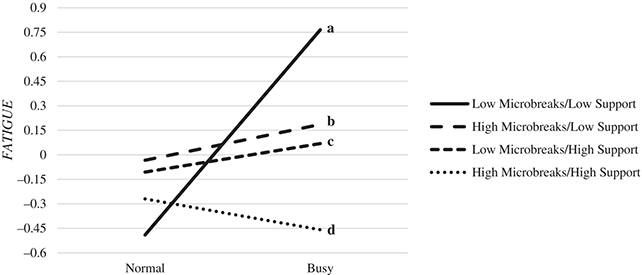In a lot of jobs, it can feel like there aren't enough hours in the working day, but a new study points to two effective ways of warding off fatigue: taking regular microbreaks and getting support from a supervisor.
The study comes from researchers at Wake Forest University, Virginia Commonwealth University (VCU), and Northeastern University in the US, and could help make the difference between slumping or soaring during a working afternoon.
Taking microbreaks and getting supervisor support had positive effects on end-of-day fatigue, as well as subsequent sleep quality and next-day energy, the researchers found. Using both measures together proved most effective in the battle against tiredness.

"First, microbreaks are a simple, cost-effective way to manage fatigue, especially when workloads are high," says VCU School of Business accountant Lindsay Andiola. "Second, supervisory support plays a critical role in mitigating fatigue."
"Together, these two mechanisms offer the most substantial relief for professionals working through busy seasons or other high-stress work periods."
The researchers surveyed 44 accountants about their work habits before staging an controlled experiment on fatigue and microbreaks with another 179 participants.
Both microbreaks and regular supervisor support were shown to reduce fatigue. For the working accountants, the benefits of these interventions were only significant at the busiest time of the year – suggesting they're most useful when they're most needed, at times of higher stress.
What's more, the follow-up experiments revealed microbreaks were also associated with improved accuracy during audits at work, something that has been known to decline when accountancy companies are put under more pressure.
"Public accountants routinely experience and struggle with deadline pressures, long hours, and significant workloads," write the researchers in their published paper.
"These job demands lead to high levels of fatigue and burnout, which can adversely affect audit quality in the short term and increase turnover in the long term."
Effective microbreaks can be as short as a minute, the researchers say: it might involve reading a short news article, or stopping for a coffee, or taking some time to do some stretches. Supervisor support, meanwhile, could require checking in with employees, offering help, and showing appreciation for what they're doing.
While most workers have limited control over their manager's activities, many can take responsibility for their fatigue levels by considering ways to break up their workload to include brief moments of downtime. While the study didn't look at the optimal timings for microbreaks their results were based on just one minute breaks.
"By implementing these strategies, firms can enhance both employee well-being and audit quality, ultimately fostering a more sustainable and productive work environment," write the researchers.
The research has been published in Contemporary Accounting Research.
